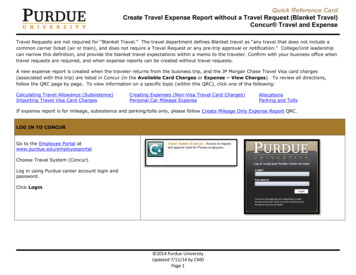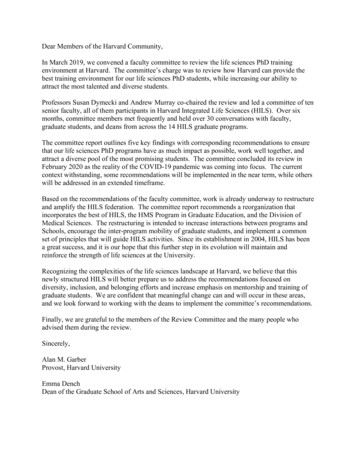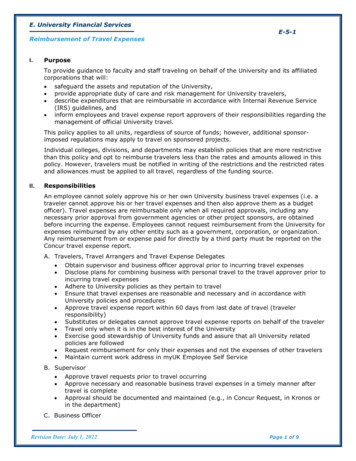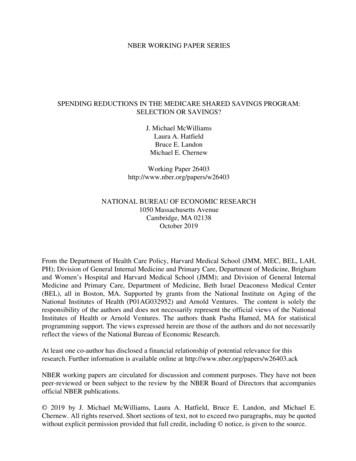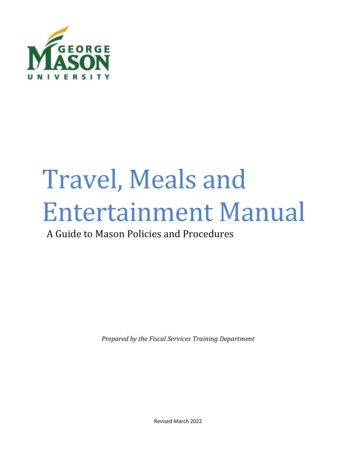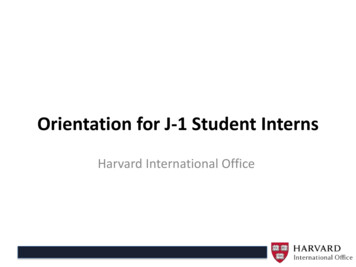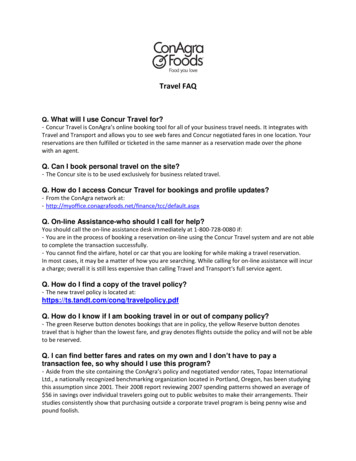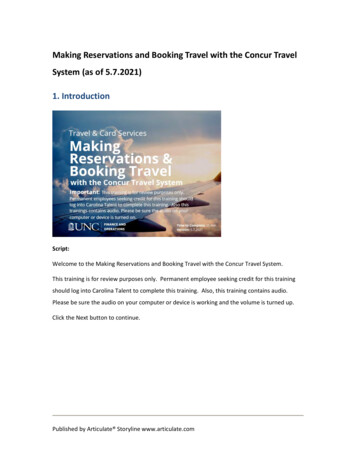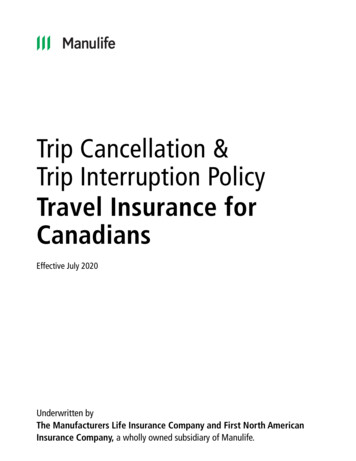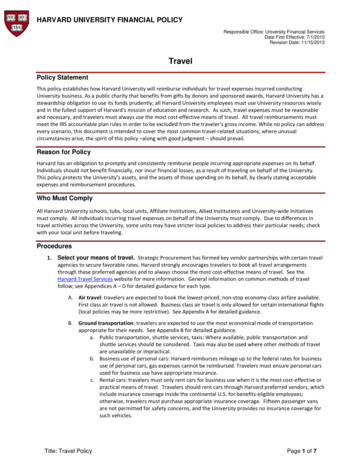
Transcription
HARVARD UNIVERSITY FINANCIAL POLICYResponsible Office: University Financial ServicesDate First Effective: 7/1/2010Revision Date: 11/15/2013TravelPolicy StatementThis policy establishes how Harvard University will reimburse individuals for travel expenses incurred conductingUniversity business. As a public charity that benefits from gifts by donors and sponsored awards, Harvard University has astewardship obligation to use its funds prudently; all Harvard University employees must use University resources wiselyand in the fullest support of Harvard’s mission of education and research. As such, travel expenses must be reasonableand necessary, and travelers must always use the most cost-effective means of travel. All travel reimbursements mustmeet the IRS accountable plan rules in order to be excluded from the traveler’s gross income. While no policy can addressevery scenario, this document is intended to cover the most common travel-related situations; where unusualcircumstances arise, the spirit of this policy –along with good judgment – should prevail.Reason for PolicyHarvard has an obligation to promptly and consistently reimburse people incurring appropriate expenses on its behalf.Individuals should not benefit financially, nor incur financial losses, as a result of traveling on behalf of the University.This policy protects the University’s assets, and the assets of those spending on its behalf, by clearly stating acceptableexpenses and reimbursement procedures.Who Must ComplyAll Harvard University schools, tubs, local units, Affiliate Institutions, Allied Institutions and University-wide Initiativesmust comply. All individuals incurring travel expenses on behalf of the University must comply. Due to differences intravel activities across the University, some units may have stricter local policies to address their particular needs; checkwith your local unit before traveling.Procedures1.Select your means of travel. Strategic Procurement has formed key vendor partnerships with certain travelagencies to secure favorable rates. Harvard strongly encourages travelers to book all travel arrangementsthrough these preferred agencies and to always choose the most cost-effective means of travel. See theHarvard Travel Services website for more information. General information on common methods of travelfollow; see Appendices A – D for detailed guidance for each type.A. Air travel: travelers are expected to book the lowest-priced, non-stop economy-class airfare available.First class air travel is not allowed. Business class air travel is only allowed for certain international flights(local policies may be more restrictive). See Appendix A for detailed guidance.B.Ground transportation: travelers are expected to use the most economical mode of transportationappropriate for their needs. See Appendix B for detailed guidance.a. Public transportation, shuttle services, taxis: Where available, public transportation andshuttle services should be considered. Taxis may also be used where other methods of travelare unavailable or impractical.b. Business use of personal cars: Harvard reimburses mileage up to the federal rates for businessuse of personal cars, gas expenses cannot be reimbursed. Travelers must ensure personal carsused for business use have appropriate insurance.c. Rental cars: travelers must only rent cars for business use when it is the most cost-effective orpractical means of travel. Travelers should rent cars through Harvard preferred vendors, whichinclude insurance coverage inside the continental U.S. for benefits-eligible employees;otherwise, travelers must purchase appropriate insurance coverage. Fifteen passenger vansare not permitted for safety concerns, and the University provides no insurance coverage forsuch vehicles.Title: Travel PolicyPage 1 of 7
HARVARD UNIVERSITY FINANCIAL POLICYResponsible Office: University Financial ServicesDate First Effective: 7/1/2010Revision Date: 11/15/2013d. Car/sedan/limousine service: private sedan or car services should be used only when validbusiness reasons preclude the use of more economical transportation. The use of privatesedan or car services to attend meetings on or around campus is prohibited. Harvard will NOTreimburse for limousine expenses under any circumstances.e. Bus and van rental: if chartering a bus is necessary, travelers are recommended to chartersuch buses through Harvard Campus Services Transit & Fleet department, when possible.Insurance restrictions apply when working with outside vendors.f. Rail travel: expected to be at the lowest fare that offers reserved seating.C.Lodging: the University will reimburse travelers for lodging expenses while on official Universitybusiness further than 50 miles one way from the traveler’s place of work. Travelers must stay instandard, single-occupancy rooms where available. See Appendix C for detailed guidance.D. Meals, entertainment and miscellaneous travel expenses: see Appendix D for detailed guidance.a. Individual meals: travelers will be reimbursed for reasonable individual meal expenses while onUniversity business. Per IRS regulations, the University does not reimburse individual mealexpenses for one-day travel except when the travel time is greater than 12 hours. Individualentertainment expenses, such as in-room movies, are not reimbursable.b. Business meals: all meal costs must be substantiated by a complete and explanatory businesspurpose; if a traveler hosts others at a business meal, the traveler must document eachattendee’s name (if fewer than five guests; otherwise list total number of guests), connectionto Harvard and the business conducted during the meal.2.E.Business travel accident insurance: the University maintains a business travel accident insurance policythat provides worldwide coverage for accidental death or dismemberment while employees andregistered Harvard students a re traveling on official University business. Because this coverage hasa maximum payout limit per conveyance such as aircraft or car, travelers are encouraged to travel ingroups of no more than four when possible. Non-employees are not covered by University businesstravel accident insurance. The University maintains no insurance for loss or damage to personalproperty. For more information on the University’s business travel accident insurance policy, includinginformation on what to do in the event of a claim, see the Risk Management and Audit Serviceswebsite. Zipcar users are generally encouraged to purchase the full damage waiver; see Appendix B fordetails. Any additional travel or other travel-related insurance purchased is generally not areimbursable expense, unless specifically required for certain international trips and pre-arranged withInsurance or Global Support Services.F.Emergency Travel Assistance Program: Harvard Travel Assist provides medical and security advice andreferrals and emergency evacuation services to eligible Harvard travelers abroad. To learn more aboutthe program prior to traveling and to register your trip in the Harvard Travel Registry, go to the GlobalSupport Services website.Pay for travel using an approved method.A. Corporate Card: Harvard’s Corporate Card (also called the Travel and Entertainment Card) is thepreferred payment method for travel expenses for Harvard employee travelers and employeesarranging travel on behalf of others. Using the Harvard Travel & Entertainment Card eliminates theneed to calculate foreign currency conversions—charges made using the Card are automaticallyconverted to U.S. dollars on the billing statements, usually at favorable rates. Paid employeeswho take at least three business trips per year and/or incur entertainment expenses of 5,000 ormore per year are strongly encouraged to apply for a Harvard Travel and Entertainment Card; visitthe Harvard Travel Services website for additional information. Expenses charged to theCorporate Card must be paid within 60 days to avoid late fees.B. Direct Billing using Harvard General Ledger Coding: direct billing is only available for ticketspurchased through BCD Travel, a Harvard vendor partner. A Harvard employee traveler (oremployee arranging travel on behalf of others) may directly bill Harvard departmental generalTitle: Travel PolicyPage 2 of 7
HARVARD UNIVERSITY FINANCIAL POLICYResponsible Office: University Financial ServicesDate First Effective: 7/1/2010Revision Date: 11/15/2013ledger coding for approved airline and Amtrak tickets using Harvard’s Web Reimbursementapplication. Restrictions apply to fellowship payments made to non-resident aliens. For moreinformation on direct billing, visit the Harvard Travel Services website.C.Personal Funds: travelers without access to a Travel and Entertainment Card (students, nonemployees, and employees who may travel too infrequently to apply for a Travel and EntertainmentCard) may use personal cash or a personal credit card to pay for travel expenses. The traveler can bereimbursed for these expenses AFTER the trip has occurred and upon presentation of appropriatedocumentation. Travelers should keep all required detailed receipts for reimbursement; alternately,per diems may be allowed for employees depending on local policy.D. Cash Advances:a. The University strongly discourages the use of cash advances due to financial risks and theadministrative burden associated with processing and reconciling advances. Cash advancesshould be used infrequently and must be reasonable and dictated by circumstances, such asfor incidental, out-of-pocket expenses like tips, taxis, and meals that cannot be charged tothe Travel and Entertainment Card. Daily cash advances for domestic travel should notexceed 50, and daily cash advances for international travel should not exceed 75. Cashadvances will be issued to University employees only.b. Advances must be settled based on actual expenses. Cash advances should be settledwithin fifteen (15) days of the completion of the trip. Cash advance amounts unreconciledafter 90 days will be added to the traveler’s gross income. “Reconciled” means alldocumentation submitted by the traveler, reviewed, and approved by UFS BEFORE 90 days;employees are encouraged to submit documentation well in advance of the 90 daydeadline to allow for transit and processing. Employees who fail to account for a cashadvance will NOT be eligible to obtain future cash advances.3. Get reimbursed for your travel. Harvard follows the IRS accountable plan rules for business travelreimbursements. In order to comply with IRS accountable plan regulations, travelers must provide the followinginformation when submitting their travel expenses for reimbursement. Any expense that fails to meet IRSaccountable plan rules must be treated as income to the reimbursee. Special rules apply to non-resident aliensand fellowship recipients; contact UFS for more information.A. Business connection: travel expenses must be directly related to services provided on behalf of theUniversity, not personal activities.a. Combining business with personal travel: generally, business trips should have more daysspent on business activities than personal activities. However, in certain circumstances, abusiness-related primary motivation for the trip may be more determinative than the relativenumber of days. See Appendix E for more information.b. Spousal/family member travel: expenses related to an employee’s spouse or other familymembers are not reimbursable unless there is a bona fide business purpose for their presenceon the trip. See Appendix F for more information.B.Substantiation: each reimbursement request for travel expenses must be supported by a detailedbusiness purpose that includes the following information:a. Who traveled or attended the event (e.g., all guests who attended a business-related meal)b. What type of event or activity was attended or purchase madec. When the event or activity took placed. Where the event or activity took placee. Why the expense was incurredC.Receipts: reimbursement requests for individual expenses equal to or greater than 75 must beaccompanied by receipts. All hotel receipts (usually called hotel folios) must be submitted regardlessTitle: Travel PolicyPage 3 of 7
HARVARD UNIVERSITY FINANCIAL POLICYResponsible Office: University Financial ServicesDate First Effective: 7/1/2010Revision Date: 11/15/2013of amount. Original receipts are strongly encouraged, but copies, scans or faxes are acceptable iforiginals are not available. Reimbursees and approvers are jointly responsible for ensuring duplicatereceipts are not submitted for payment.D. Missing Receipt Affidavits (MRAs): travelers who lose receipts required by this policy must submitcompleted, signed Missing Receipt Affidavits and proof of payment with their reimbursementrequests. MRAs must be used as exceptions, not on a regular basis. Missing Receipt Affidavits lackingrequired information or documentation itself will be returned to the authorized signer.E.Reimbursee signature: the traveler/reimbursee must sign all his or her reimbursement receipt reportsor expense forms.F.Timeliness of reporting requirements:a. Standard (not extended) business trips: regardless of the method used to pay for travel, UFSmust receive completed employee receipt reports within 90 days of the end date of the tripReceipt reports submitted after this date must be processed through Payroll as AdditionalPay.Receipt deadlines for standard (not extended) business trips:If UFS receives receipt report in:0-90 days after trip end date(preferably within 60 – expenseson the Corporate Card must bepaid within 60 days)91-182 days after trip end date183 days after trip end dateResult:Reimbursement without tax implications to reimburseeReimbursement will be treated as income to the employee andmust be processed via Payroll. Reimbursement will be processedas additional pay and taxes will be withheld; departments mustinclude an Additional Pay for with reimbursement request.Payments may NOT be grossed up.Expenses will NOT be reimbursed with University funds.b. Extended business trips: travelers on trips lasting over 30 consecutive days (but less thanone year) have 120 days to submit receipt reports for nontaxable reimbursement; includethe term “Extended Business Trip” at the beginning of the business purpose. Otherdeadlines are the same as for standard business trips:Receipt deadlines for extended business trips:If UFS receives receipt report in:0-120 days after trip end date(preferably within 60 – expenseson the Corporate Card must bepaid within 60 days)121-182 days after trip end date183 days after trip end dateTitle: Travel PolicyResult:Reimbursement without tax implications to reimburseeReimbursement will be treated as income to the employeeand must be processed via Payroll. Reimbursement will beprocessed as additional pay and taxes will be withheld;departments must include an Additional Pay for withreimbursement request. Payments may NOT be grossedup.Expenses will NOT be reimbursed with University funds.Page 4 of 7
HARVARD UNIVERSITY FINANCIAL POLICYResponsible Office: University Financial ServicesDate First Effective: 7/1/2010Revision Date: 11/15/2013G. Foreign currencies: all reimbursement receipt reports must be submitted in U.S. dollars with anexplanation and translation of the foreign receipts and their conversionsa. Travelers and preparers must use the currency rates that were in effect when travel tookplace (check with your school finance office for specifics); therefore, currency- exchangereceipts must be saved and used for converting foreign currencies back to U.S. dollars on thereimbursement receipt report.b. When more than one exchange of the same type of foreign currency is made during thereporting period, use a weighted-average exchange rate (i.e., the total of U.S. dollars dividedby the total amount of foreign currency).c. For current foreign currency conversion rates, visit the Harvard Travel Services website.H. Use of per diems:a. Local units have the discretion to allow or prohibit use of per diems, which are onlyallowed for Harvard employees. However, travelers are encouraged to submitreimbursements for actual meal and lodging expenses, particularly for long trips involvingmultiple stops in different cities. Harvard will reimburse travelers up to the federal per diemrate; for a link to current government per diem rates, visit the Harvard Travel Serviceswebsite. Per diems will not be paid in advance of a trip.b. Sponsored regulations state that travel costs may be charged on an actual cost basis, on aper diem or mileage basis in lieu of actual costs incurred, or on a combination of the two(i.e., actuals for lodging and per diem for meals, or vice versa), provided the method used isapplied to an entire trip and not to selected days of the trip, and results in chargesconsistent with those normally allowed in like circumstances in the institution’s nonfederally sponsored activities.I.4.Elective fees: some hotels, airlines and other vendors ask customers to pay for “elective fees” such ascarbon offset credits, donations to charities, etc. Harvard travelers may pay for these fees withpersonal funds, but should not submit them for reimbursement with University funds. “Resort fees”that are mandatory for all guests staying at a hotel are reimbursable.Understand rules for special reimbursement situations.A. Expenses payable by outside organizations: Travelers should not seek payment from Harvard forbusiness-related expenditures that will be reimbursed from another source. Where travel and otherexpenses will ultimately be paid by a third party, travelers should seek reimbursement from the thirdparty directly. However, under extenuating circumstances, such as uncertainty regarding the outsideorganization’s willingness to pay, or a multi-leg trip with expenses payable by Harvard and an outsideentity commingled, Harvard may reimburse an individual for some or all such expenses with FinancialDean approval. Delay in the outside party’s payment to the traveler does not constitute an extenuatingcircumstance. If Harvard does reimburse an individual for business expenses that are later reimbursedby a third party, the individual must repay Harvard in full for any duplicate reimbursements. Under nocircumstances will Harvard provide up-front payment for expenses that are not related to Universitybusiness, even if the recipient intends to later reimburse Harvard.B.Use of University tax exemption: note that individuals who use a personal payment mechanism (forexample, their own cash or a personal credit card) to make a purchase on behalf of the UniversityCANNOT use the University’s sales or meals tax exemption. For Harvard’s sales tax exemption to bevalid, Harvard must make the entire purchase directly. Pursuant to local policies, Harvard mayreimburse individuals for sales or meals tax incurred on valid University purchases.C.Employee recruitment: Harvard can reimburse prospective employees for authorized travel expensessuch as airfare, hotel, and meals incurred during the recruitment without tax consequences. Once acandidate accepts an offer, additional travel or house-hunting expenses incurred by the incomingemployee and family are considered taxable (actual moving expenses may be nontaxable, see below).Requirements or limitations in specific sponsored contracts and grants may be applicable toTitle: Travel PolicyPage 5 of 7
HARVARD UNIVERSITY FINANCIAL POLICYResponsible Office: University Financial ServicesDate First Effective: 7/1/2010Revision Date: 11/15/2013recruitment travel. See the Office of the Controller website.D. Moving expenses: reimbursement for the relocation of newly recruited personnel is authorized atthe department level, and should be approved by the department’s financial dean, vice president, ordepartment head. Under certain circumstances, an employee’s moving expenses may be nontaxable.However, the University is required to report all moving reimbursements to the IRS; see the Office ofthe Controller website. Local HR offices can provide additional guidance.E.Fellowships (also called stipends or allowances): if student or non-employee travel is related to anindividual’s personal pursuit of study or research, that travel is not considered University businessand must be paid as a fellowship to the recipient. A fellowship is any amount paid or allowed to, or forthe benefit of, an individual in the pursuit of study or research. A fellowship may take the form ofpayments to the recipient, such as stipend payments or reimbursements for supplies or non-Universitytravel expenses. These expenses must be processed via HCOM Payment Request through theUniversity’s Accounts Payable system, and not processed as a reimbursement. The recipients are notemployees performing services and therefore cannot satisfy the business-purpose requirement underan accountable plan, as defined by the IRS. Contact UFS for additional information.F.Non-resident aliens: University Financial Services must review all reimbursement requests payable tonon-resident aliens prior to payment, to ensure the expenses are reimbursable under IRS andDepartment of Homeland Security regulations.Responsibilities and ContactsFinancial deans or equivalent tub financial officers ensure that local units, specifically travelers and approvers, abide bythis policy and the accompanying procedures. At their own discretion, tubs may impose stricter local policies.University Financial Services (UFS), within the Office of the Controller processes travel reimbursement requests, auditsreimbursement requests to ensure that they are compliant with University policy and with IRS and other regulations, andrecords and reports any taxable reimbursements. Contact: (617) 495-8500Office for Sponsored Programs (OSP) helps determine which travel expenditures are reimbursable under a particulargrant or contract, and is available to assist with any questions related to travel on sponsored funds. Contact: (617) 4964771 or http://osp.fad.harvard.edu/Risk Management and Audit Services (RMAS), within the Office of the Vice President for Finance, is responsible forperforming periodic, random departmental audits, which include reviews of travel and entertainment business expensereimbursements. Main Office Contact: http://vpf- web.harvard.edu/rmas/insurance.html; Risk Financing and Insurancewebpage: nd-insuranceGlobal Support Services: provides operational guidance and resources to students, faculty, and staff traveling ormanaging projects abroad, and manages Harvard Travel Assist program. Contact: http://globalsupport.harvard.edu/Strategic Procurement provides guidance and answers questions related to preferred vendors. Contact: (617) 495-9308DefinitionsAccountable plan: An IRS term for a plan under which an employer reimburses an employee for expenses and is notrequired to report the reimbursement as taxable income to the employee. The employee must document businesspurpose, substantiate expenses, and return any amount in excess of substantiated expenses to the employer.Business meals: Meals taken with students, colleagues, or donors during which specific business discussions take place.Employees will be reimbursed based on reasonable actual costs as determined by the authorized approver.Title: Travel PolicyPage 6 of 7
HARVARD UNIVERSITY FINANCIAL POLICYResponsible Office: University Financial ServicesDate First Effective: 7/1/2010Revision Date: 11/15/2013Entertainment expenses: Entertainment expenses include outings to theaters or other cultural events when a businessdiscussion takes place during, immediately before, or immediately after the event.Hotel folio: A hotel industry term used describe a list of room charges for a guest (e.g., invoice or bill).Incidentals: An IRS term for minor expenses included in the per diem rate for "meals and incidentals.” Incidentalexpenses include tips, mailing expenses, etc.Individual meals: Meal expenses of travelers on a business trip. Can be reimbursed according to actual and reasonablecosts, or on a per diem basis based on IRS rates.Miscellaneous expenses: Expenses for ground transportation (e.g., taxis, airport shuttle services, public transportation),tips, and other various non-personal expenses.Official travel: Travel on official University business from one’s home or normal place of employment to anotherdestination, including University facilities outside the Boston metropolitan area. Per IRS rules, official travel does notinclude commuting to and from work.Per diem: Reimbursement rates established by the federal government for travel inside and outside the U.S.Personal expenses: Expenses for personal items such as clothing, luggage, toiletries, newspapers, magazines, or movies.Personal expenses are generally not reimbursable.Related ResourcesJob aid on completing reimbursement forms: goryID 503&y 0Harvard Travel Services Website: .phpCar Rental Insurance Guidelines: ng/ground.phpGlobal Support Services: http://traveltools.harvard.eduFly America Act and Open Skies uments/open skies agreement.pdfEmployee recruitment and moving expense information: see the Office of the Controller website at http://vpfweb.harvard.edu/ofs/tax services/emp mov.shtmlRevision History11/15/2013: clarified that travelers should not seek payment from Harvard for business-related expenditures that will bereimbursed from another source; allowed schools to define their own thresholds for airline seat upgrades; addedinformation to car rental insurance grid.6/30/2013: updated format, increased reimbursable amount for airline seat upgrades to 100 per flight; addedinformation on the Open Skies Agreement; allowed copies/scans/faxes of receipts when originals are not available; addedinsurance restrictions on rental of 15-passenger vans; added information about Harvard’s Commuter Choice Zipcarprogram, added guidance on reimbursement of elective fees.AppendicesAppendix A: Detailed Guidelines for Air TravelAppendix B: Detailed Guidelines for Ground TransportationAppendix C: Detailed Guidelines for LodgingAppendix D: Detailed Guidelines for Meals, Entertainment and Miscellaneous ExpensesAppendix E: Guidance for Combined Business and Personal TravelAppendix F: Guidance for Spousal/Family Member TravelTitle: Travel PolicyPage 7 of 7
Appendix A: Air Travel1.Preferred travel partners.a. Harvard strongly encourages travelers to book airline tickets through one of Harvard’s preferred travelagencies and to use our preferred airlines where possible. To learn more about Harvard’s travel agencypartners and exclusive travel discounts, visit the Harvard Travel Services website,at ng/index.php.b. US Airways Shuttle Program – USAirways Shuttle travel - The most cost effective way to purchase yourshuttle tickets is through the ShuttlePro program. This is the only time you are encouraged to go outsideof our preferred travel agencies. The ShuttlePro program allows you to purchase your tickets at aUSAirways Shuttle kiosk at the discounted Harvard fare. In order to participate in this program you mustregister. For directions, goto: ttleProRegistrationInstructionR1.pdf2.Fare guidelinesa. Generally, travelers are expected to book the lowest-priced, non-stop airfare available. First class airtravel is not allowed. Business class, where offered on a three-cabin flight, is acceptable in limitedcircumstances when the non-stop flight time exceeds six hours. Under extenuating circumstances, such asdocumented medical reasons, business class or first class service may be reimbursable where it is normallyprohibited, provided the expense is approved by the traveler’s Financial Dean.Duration of single non-stop flight issix (6) hours or lessLowest-priced non-stop economyDomestic Air Travel inside theclass airfare onlycontiguous 48 United StatesAir Travel Involving Canada, Mexico, Lowest-priced non-stop economyAlaska, Hawaii, or U.S. Territoriesclass airfare onlyand Possessions when flying to,from, or within these locationsIf charged to federal funds: lowestInternational Air Travel withpriced non-stop economy classdestination and/or originairfareoutside the United States and itsIf charged to other funds: Lowestterritories and possessionspriced non-stop business classairfareDuration of single non-stop flightis more than six (6) hoursLowest-priced non-stop economyclass airfare onlyLowest -priced non-stopbusiness class (where offered ona three-cabin flight), if permittedby local policy and budgetLowest -priced non-stop businessclass, (where offered on a threecabin flight) if permitted by localpolicy, budget, and sponsor (ifcharged to sponsored funds)b.Ticket upgrades: Some airlines charge fees for preferred seating and similar options. Where necessaryand permitted by local policies and budget, reasonable costs for these items are reimbursable. However,these costs cannot be charged to federally sponsored awards. In these cases, other University funds mustbe used for reimbursement.c.Airline frequent flyer programsi. Free tickets: Harvard CANNOT reimburse travelers for tickets purchased with frequent-flyermiles. Monetary compensation provided to an employee in exchange for a free ticket isconsidered additional income. Harvard will reimburse fees associated with issuing a frequentflyer ticket, such as taxes and agency or airlines services fees. Travelers must always select thelowest-priced flight available regardless of personal frequent-flyer memberships.ii. Upgrades: travelers may use personal, frequent-flyer-program miles to upgrade tickets providedthere is no additional cost to the University. Note
2. Pay for travel using an approved method. A. Corporate Card: Harvard's Corporate Card (also called the Travel and Entertainment Card) is the preferred payment method for travel expenses for Harvard employee travelers and employees arranging travel on behalf of others .
